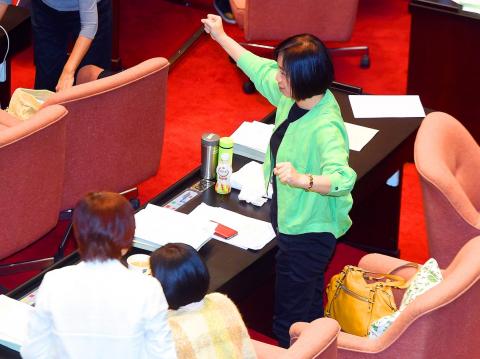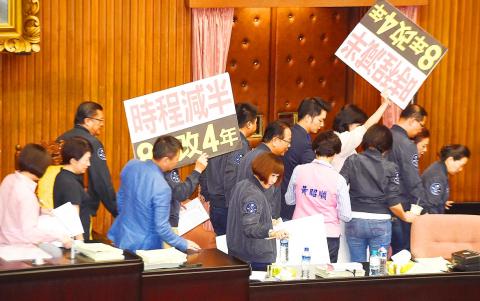The special act on the Forward-looking Infrastructure Development Program yesterday cleared a third reading at the legislature, with lawmakers passing a Democratic Progressive Party (DPP) motion to adjust the program’s budget from NT$882.49 billion (US$28.93 billion) over eight years to NT$420 billion over four years.
The legislature met in plenary session to review the bill after the DPP caucus on Tuesday made a concession to adjust the program’s budget and time frame during cross-caucus negotiations, ending the Chinese Nationalist Party’s (KMT) occupation of the legislative speaker’s podium that began on Monday morning.
The DPP, KMT and People First Party (PFP) caucuses on the same day signed on a DPP motion to divide the program into two stages of four years each, with a NT$420 billion special budget for stage one.

Photo: Liao Chen-huei, Taipei Times
Budget requests for the second stage are to be delivered to the legislature for review with the proviso that its size and time frame does not exceed the first budget.
The motion added three projects — establishing friendly nursing rooms in response to low birth rates; measures to ensure food safety; and nurturing talent and boosting employment — to the five projects outlined by the Executive Yuan: Rail construction, digital infrastructure, “green” energy, urban-rural development and aquatic infrastructure.
The National Development Council is to oversee the program, while Cabinet-level agencies are to be responsible for planning budgets for projects outlined in the program and local governments entrusted with a project should plan budgets accordingly, the motion said.

Photo: Liao Chen-huei, Taipei Times
Central government agencies must conduct environmental impact assessments, and viability and cost-effectiveness plans, and submit the reports to the Executive Yuan for approval before a budget is allocated.
The debt ceiling for the overall spending of the entire program is set at 15 percent of the government’s annual expenditure, in accordance with the Public Debt Act (公共債務法).
Should a specific project run under budget, the excess funds should be returned to the central government, the motion said.
A draft article — proposed in response to New Power Party (NPP) and KMT demands — which says the Control Yuan and concerned agencies should punish officials found to be involved in illegal activity that causes a project to fall behind the 80 percent completed mark was also passed yesterday.
Land expropriation carried out for a project must be done according to due procedure on the condition that it is necessary and it serves the public interest.
The council should regularly update the progress of the projects on the Executive Yuan’s Web site.
Citing the low utilization rate of the Kaohsiung Mass Rapid Transit (MRT) system, KMT legislators criticized the government’s plan to dole out large sums — previously about NT$420 billion — to construct railway systems, prompting a war of words with the DPP caucus.
“The MRT might be taken for granted by Taipei residents, but for people living in the south of the nation it has remained a luxury,” DPP Legislator Rosalia Wu (吳思瑤) said, adding that a MRT system should not be a privilege of Taipei residents.
“The final version of the bill was rendered in response to overwhelming public pressure and strong criticism,” KMT Legislator Lee Yen-hsiu (李彥秀) said.
With budget proposals set to be reviewed by the legislature next week, the DPP had better be prudent over its budget allocation to avoid triggering a backlash, she said.

FALSE DOCUMENTS? Actor William Liao said he was ‘voluntarily cooperating’ with police after a suspect was accused of helping to produce false medical certificates Police yesterday questioned at least six entertainers amid allegations of evasion of compulsory military service, with Lee Chuan (李銓), a member of boy band Choc7 (超克7), and actor Daniel Chen (陳大天) among those summoned. The New Taipei City District Prosecutors’ Office in January launched an investigation into a group that was allegedly helping men dodge compulsory military service using falsified medical documents. Actor Darren Wang (王大陸) has been accused of being one of the group’s clients. As the investigation expanded, investigators at New Taipei City’s Yonghe Precinct said that other entertainers commissioned the group to obtain false documents. The main suspect, a man surnamed

DEMOGRAPHICS: Robotics is the most promising answer to looming labor woes, the long-term care system and national contingency response, an official said Taiwan is to launch a five-year plan to boost the robotics industry in a bid to address labor shortages stemming from a declining and aging population, the Executive Yuan said yesterday. The government approved the initiative, dubbed the Smart Robotics Industry Promotion Plan, via executive order, senior officials told a post-Cabinet meeting news conference in Taipei. Taiwan’s population decline would strain the economy and the nation’s ability to care for vulnerable and elderly people, said Peter Hong (洪樂文), who heads the National Science and Technology Council’s (NSTC) Department of Engineering and Technologies. Projections show that the proportion of Taiwanese 65 or older would

Democracies must remain united in the face of a shifting geopolitical landscape, former president Tsai Ing-wen (蔡英文) told the Copenhagen Democracy Summit on Tuesday, while emphasizing the importance of Taiwan’s security to the world. “Taiwan’s security is essential to regional stability and to defending democratic values amid mounting authoritarianism,” Tsai said at the annual forum in the Danish capital. Noting a “new geopolitical landscape” in which global trade and security face “uncertainty and unpredictability,” Tsai said that democracies must remain united and be more committed to building up resilience together in the face of challenges. Resilience “allows us to absorb shocks, adapt under

Taiwan Semiconductor Manufacturing Co (TSMC, 台積電) yesterday said it is building nine new advanced wafer manufacturing and packaging factories this year, accelerating its expansion amid strong demand for high-performance computing (HPC) and artificial intelligence (AI) applications. The chipmaker built on average five factories per year from 2021 to last year and three from 2017 to 2020, TSMC vice president of advanced technology and mask engineering T.S. Chang (張宗生) said at the company’s annual technology symposium in Hsinchu City. “We are quickening our pace even faster in 2025. We plan to build nine new factories, including eight wafer fabrication plants and one advanced